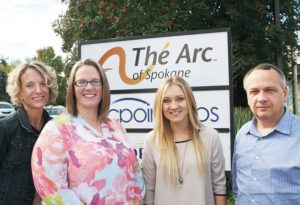The Arc Commends Department of Justice’s Report on Investigation of the Baltimore City Police Department
Washington, DC – Last week, the Department of Justice’s (DOJ) Civil Rights Division released a report following an investigation into the past conduct of the Baltimore City Police Department (BPD). DOJ concluded that there is “reasonable cause to believe that BPD engaged in a pattern or practice of conduct that violates the Constitution or federal law” by engaging in unconstitutional stops, searches, and arrests; using enforcement strategies that produce severe and unjustified disparities in the rates of stops, searches, and arrests of African-Americans; using excessive force; and retaliating against people engaging in constitutionally-protected expression. Among these troubling findings, The Arc noted that the treatment of individuals with disabilities by law enforcement was included in the report, which featured a full section on the use of unreasonable force against individuals with disabilities highlighting that “BPD officers repeatedly fail to make reasonable modifications necessary to avoid discrimination in violation of Title II of the Americans with Disabilities Act of 1990 (ADA).”
Among other things, the investigation recommended that BPD offer crisis intervention training, previously offered to only new recruits, to veteran officers as well. DOJ noted that such training helps officers “identify whether an individual is in crisis or engaging in behavior related to a disability, to interact effectively with people with disabilities, to de-escalate a crisis, and to connect the individual with local resources to provide treatment or support.”
“Far too often, people with intellectual and developmental disabilities are in situations with law enforcement that unnecessarily escalate because officers aren’t trained in crisis prevention or how to recognize and accommodate various disabilities. This is not only happening in Maryland, it is a serious problem nationwide. We have got to flip the script when it comes to law enforcement training so that police departments understand that recognizing and appropriately accommodating disability in the line of duty is not optional, but is a fundamental aspect of their compliance with civil rights laws, such as the ADA. The recommendations in this report should be adopted across the country, so that we can break the cycle of discrimination that many minorities, including people with disabilities, face, and make our communities safer and more just for all,” said Leigh Ann Davis, Director, Criminal Justice Initiatives, The Arc.
The report found that BPD officers “have escalated interactions that did not initially involve criminal behavior, resulting in the arrest of, or use of force against, individuals in crisis, or with mental health disabilities or I/DD, or unnecessary hospitalization of the person with mental health disabilities or I/DD.” These unnecessary hospitalizations often violate the “integration mandate” of the ADA and the landmark Olmstead decision, which require public entities to administer services, programs, and activities for people with disabilities in the most integrated setting appropriate and prohibits unjustified institutionalization of people with disabilities.
“The findings in the report are disturbing. It is particularly painful reading this report on the heels of the 26th Anniversary of the ADA. The Arc Maryland stands ready to assist with necessary training to police officers to appropriately respond to people with I/DD. We urge BPD to implement specialized training and de-escalation techniques as tactics to reform the system and better serve people with disabilities, African Americans, and any other member of the community that interacts with the criminal justice system,” said Poetri Deal, Director of Public Policy & Advocacy, The Arc Maryland.
Steve Morgan, Executive Director, The Arc Baltimore, said: “The BPD is already working with us to extend the crisis intervention training, previously offered to select officers only, to the entire force. We are working together to address the recommendations, expand their knowledge, and improve community relations.”
The Arc runs the National Center for Criminal Justice and Disability (NCCJD), the first national effort of its kind to bring together both victim and suspect/offender issues involving people with intellectual and developmental disabilities (or I/DD) under one roof.
NCCJD is a national clearinghouse for information and training on the topic of people with I/DD as victims, witnesses and suspects or offenders of crime. The Center provides training and technical assistance, an online resource library, white papers, and more. The Center created Pathways to Justice,® a comprehensive training program facilitated through chapters of The Arc, which assists officers to both identify disability, and know how to respond in ways that keep all parties as safe as possible. Pathways to Justice utilizes a multi-disciplinary response that provides a foundation for a collaborative approach among community partners.
Read more about The Arc’s take on criminal justice reform and people with I/DD in our recent blog in the Huffington Post.
The Arc advocates for and serves people with intellectual and developmental disabilities (I/DD), including Down syndrome, autism, Fetal Alcohol Spectrum Disorders, cerebral palsy and other diagnoses. The Arc has a network of more than 650 chapters across the country, including 11 in Maryland, promoting and protecting the human rights of people with I/DD and actively supporting their full inclusion and participation in the community throughout their lifetimes and without regard to diagnosis.



 by Mary Clayton
by Mary Clayton





